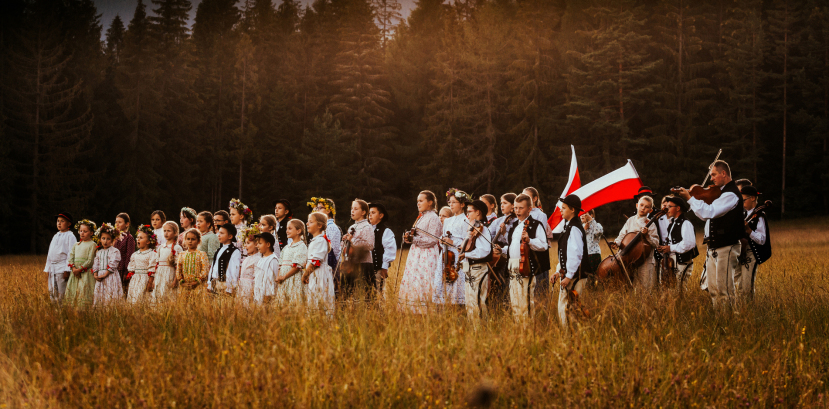Orava is a historical and ethnographic land, the history of which unfolded to the rhythm of the development of Poland and Hungary – the two states within the borders of which its fortunes were created centuries ago. Today, as it leans against the Old Witches’ Mountain massif from the south, this land is transected by the Polish-Slovakian border, leaving just a small part of Upper Orava on the Polish side of the border. The Orava culture is a peculiar and unique blend of Polish, Slovakian, Hungarian and Wallachian influences, based on the foundation of herding-related economy and farming. The Upper-Orava folk music, which was shaped by this culture, is admirably graceful and simple, thus reflecting the character of the local population. As an indispensable element of everyday life, this music has over centuries accompanied the Orava Highlanders in their annual and family ceremonies, and in all manner of activities, e.g. ox and sheep herding, log driving. Orava is also a land of ancient architecture – churches, residential and farm buildings of a development style uncommon in other regions. MAŁOLIPNICANIE Folk Ensemble from Lipnica Mała in Orava was established in 2012, and it numbers around fifty children aged 4-14. As they sing, dance and play music, the children grow to embrace the tradition, customs, the local idiom and the Orava culture “sensu largo”. As the representatives of the Orava Highlanders, MAŁOLIPNICANIE have prepared, for this year's edition of the Festival of the Children of Mountains, a programme entitled “Pasiynie gynsi” [grazing geese]. Even though work and numerous household chores filled children’s lives since early childhood, they could still make some time to meet and play with their peers. The activity of grazing geese offered such an opportunity. In the stage performance the young inhabitants of Lipnica Mała will present the following play and games: “koło młyńskie”, “scur”, “talorecek”, “skokanecki”, as well as Orava dances: “polecka”, “jelyniosek”, ”zyd”, “wrona” and “kotecka”. Anna Olesińska (song and dance) and Paweł Czaja (musical instruments) are the ensemble instructors. Grażyna Kubacka is the ensemble manager responsible for organizational matters.
MAŁOLIPNICANIE
Edition 2020/2021

